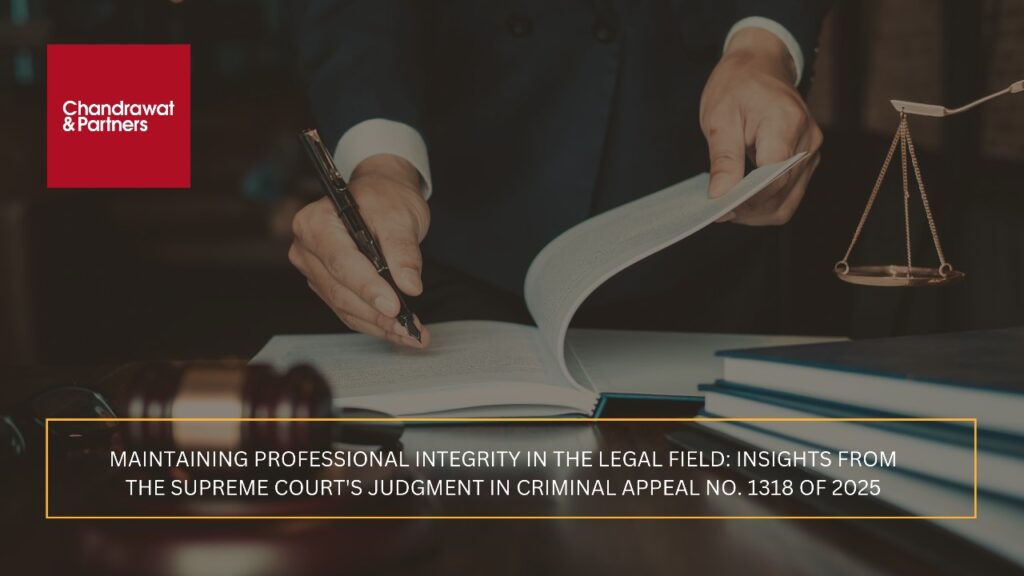Home > Recent Judgements > Maintaining Professional Integrity in the Legal Field: Insights from the Supreme Court’s Judgment in Criminal Appeal No. 1318 of 2025
Mar 28, 2025
Maintaining Professional Integrity in the Legal Field: Insights from the Supreme Court’s Judgment in Criminal Appeal No. 1318 of 2025
The Supreme Court of India delivered an important judgment in Criminal Appeal No. 1318 of 2025: Ramesh Kumaran vs. State Through the Inspector of Police, which sheds light on the conduct of legal professionals in the courtroom. This ruling is significant not just for the case at hand but also for the broader legal community, as it underscores the need for maintaining professional decorum and dignity within the legal profession.
Overview of the Case
At the heart of this case was a dispute where Ramesh Kumaran, an appellant, faced allegations related to the conduct of a member of the legal profession involved in a criminal matter. The issue arose when an attorney, involved in the proceedings, was reported to have made threats and engaged in unbecoming behavior. The threat was directed towards a fellow professional, which raised serious concerns about the integrity and ethical standards that must govern the conduct of legal practitioners.
In this context, the Supreme Court was called upon to intervene and make a judgment on the matter. The case highlighted two critical aspects of professional conduct: the importance of maintaining dignity in the legal profession and the consequences of threats made within the legal community.
The Importance of Professionalism in the Legal Field
The legal profession is built on the foundation of trust, integrity, and respect. Lawyers, judges, and other legal professionals are entrusted with upholding the rule of law, ensuring justice, and maintaining ethical standards. A threat made by a member of the Bar not only compromises the integrity of the profession but also undermines public confidence in the judicial system.
The Supreme Court’s judgment in this case reaffirmed the principle that maintaining the dignity of the legal profession is of paramount importance. Legal practitioners are expected to conduct themselves in a manner that upholds the principles of justice, fairness, and respect for the law. Any actions that detract from these values such as threats, intimidation, or unprofessional conduct have the potential to harm the legal system and the public’s perception of it.
The Court’s Concern Over Threats and Unprofessional Behavior
In the judgment, the Supreme Court expressed its deep concern over the threatening behavior exhibited by the legal professional. Such actions not only violate the professional code of conduct but also create an atmosphere of hostility and intimidation within the legal system. The Court emphasized that such conduct could have long-lasting negative effects, not just on the individuals directly involved, but also on the legal community.
Furthermore, the judgment highlighted that respect for fellow professionals is a fundamental pillar of the legal system. Lawyers and judges are expected to resolve disputes amicably, fostering an environment of collaboration and mutual respect. In this case, the Court stressed that threats and unprofessional conduct could never be justified and must be addressed decisively.
The Apology and the Need for Amicable Resolution
In a surprising turn of events, Ramesh Kumaran, the appellant, tendered an apology for the actions that led to the dispute. This apology was accepted by the Court, signaling that while serious misconduct had occurred, the parties involved were taking steps toward reconciliation and an amicable resolution. The Court, in this regard, highlighted the value of apology as a means of diffusing conflict and restoring harmony between professionals.
The Court’s acceptance of the apology also sends a strong message about the importance of accountability and responsibility. It serves as a reminder that while legal disputes are inevitable, maintaining decorum and taking steps to resolve issues amicably is essential for the health of the profession. By accepting the apology, the Court reinforced that restoring professional decorum and fostering a culture of cooperation and mutual respect should always be prioritized.
Implications for Legal Practitioners
This judgment serves as a valuable lesson for legal practitioners across the country. It reinforces the need for ethical behavior, respect for colleagues, and the protection of the integrity of the legal profession. Legal professionals, especially those working in contentious fields like criminal law, must always be mindful of their conduct, both inside and outside the courtroom.
The Court’s decision also emphasizes that lawyers are not just advocates for their clients but are also ambassadors for the legal system. Their actions, both in and out of court, reflect the entire judicial process. By maintaining high standards of professionalism, legal practitioners contribute to a more effective, fair, and respected judicial system.
Conclusion
The Supreme Court’s judgment in Criminal Appeal No. 1318 of 2025 serves as a timely reminder of the importance of professional conduct and ethical behavior in the legal field. The Court’s focus on maintaining the dignity of the legal profession, addressing threats made by a member of the Bar, and promoting the resolution of disputes through apology and reconciliation highlights the need for amicable conflict resolution and mutual respect among legal practitioners.
By upholding these values, the Court has not only addressed the issues specific to this case but also reinforced broader principles that are crucial for maintaining the integrity of the legal profession. This judgment sets a precedent for the legal community, urging all professionals to act with responsibility and respect for their colleagues and the system they serve. Ultimately, the judgment emphasizes that the legal profession is not just about winning cases but about ensuring justice, fairness, and the maintenance of public trust in the judicial process.
For more information or queries, please email us at
enquiries@chandrawatpartners.com





